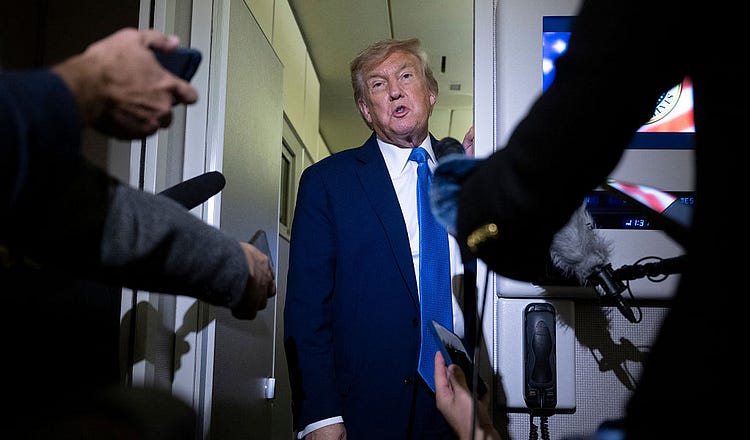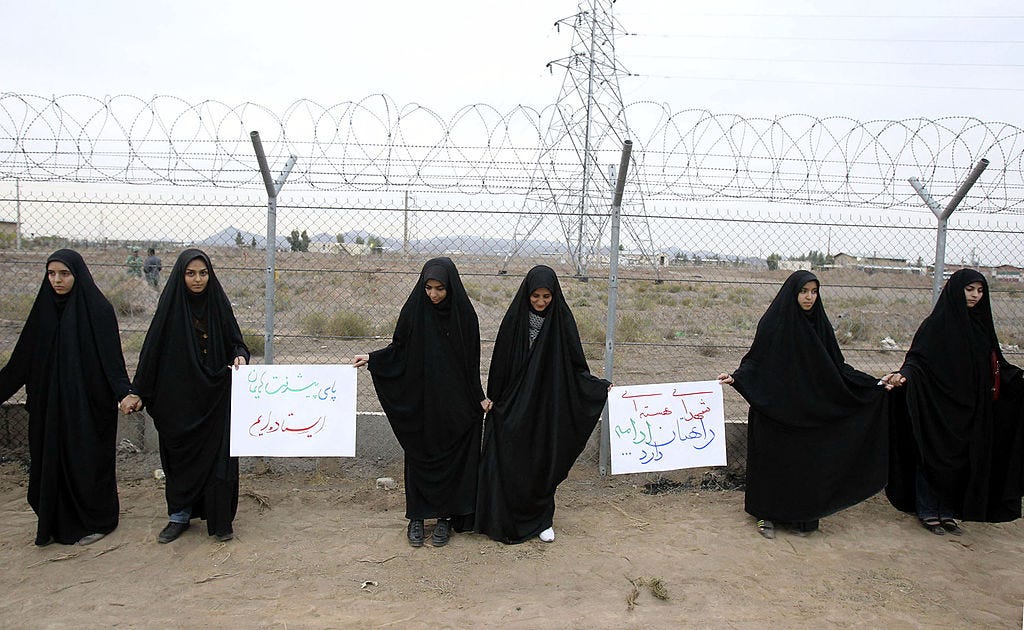
The Free Press

For any U.S. president, the decision whether to intervene in a foreign war is a momentous one. This is the week when President Donald Trump has to make that decision. Should he, or should he not, use American air power to finish the job Israel has very nearly completed, ensuring that Iran never possesses nuclear weapons?
We understand why Trump is weighing the decision with the utmost care—why he gave negotiations with Iran a 60-day chance, and why he has spent many hours with his national security team, hearing their different views.
Opponents of U.S. military action tell a simplified story of past interventions—in Vietnam, most obviously, but some also cite Iraq and Afghanistan—that led to “forever wars.” But isolationists have trouble arguing that the United States should never intervene abroad. Would the Cold War have gone better if Harry Truman had abandoned South Korea to Stalin’s proxies in 1950? Would the Middle East have benefited if Kuwait had been left in Saddam Hussein’s hands in 1991? Would the Balkans be stabler today if Bill Clinton had not belatedly acted to save Bosnia and then Kosovo from Slobodan Milošević’s aggression?
None of these analogies is really applicable anyway, because the United States today is not being asked to send soldiers to invade or occupy Iran. The action President Trump must decide upon is clearly defined and limited in its duration and scale, since much of the work of defeating Iran has already been done by Israel.
The past six days have marked a strategic inflection point. After decades of preparation, Israel has acted: striking critical nuclear sites, dismantling missile production lines, and eliminating senior figures in Iran’s military and Revolutionary Guard Corps. These operations have already set Iran’s program back by years.
The current campaign did not begin spontaneously. It is the result of a long-planned strategy built on four prerequisites: neutralizing Hezbollah, crippling Iran’s ballistic missile production, establishing an air corridor to Tehran—and later, air superiority over Iran—and securing American support. The first three were achieved by October. Once the fourth was in place, earlier this month, the campaign could begin.
We both salute the extraordinary skill with which the Israel Defense Forces and Mossad have executed Israel’s war plan. For generations, cadets at military academies around the world will study Operation Rising Lion as a classic of modern asymmetric warfare, brilliantly combining mastery in the air with covert operations.
Israel has moved and continues to move with determination and dispatch. The support of allies, first and foremost the United States, has been crucial.
Much of Iran’s nuclear weapons program now lies in ruins, and many of the scientists who ran it are dead. But one key site remains at Fordow. Deep underground and heavily fortified, it holds the core of Iran’s remaining enrichment capability: eight cascades with over 3,000 centrifuges. The facility’s scale allows Iran to rapidly enrich weapons-grade uranium. It could do so in just three weeks, according to the International Atomic Energy Agency (IAEA). Leaving it intact risks allowing the Islamic Republic to rebuild and resume its quest for the ultimate weapon of mass destruction.
Fordow is built into the mountains near Qom, encased under at least 300 feet of limestone, and protected by additional layers of reinforced concrete shielding and other structural defense measures that increase the facility’s ability to survive a heavy air attack. There is no credible way that Israel alone can destroy it.
Only one air force has the power to finish off Fordow. The United States designed and built the GBU 57A/B Massive Ordnance Penetrator (MOP) precisely for such a task. The MOP is a 30,000-pound, 20-foot-long weapon. Its warhead contains 5,300 pounds of explosives. Cased in a hard steel alloy, the weapon is dropped from high altitude, accelerates to Mach 2 or 3, punches into the target, and rips through layers of protection before detonating. Three to eight MOPs would suffice to render Fordow defunct.
The MOP is designed for American B-2 Spirits, all of which are based at Whiteman Air Force Base in Missouri. Each B-2 can carry two MOPs, meaning a strike wave of two to six B-2s delivering four to 12 MOPs would get the job done.
Fordow is 6,800 miles away from Missouri, so the B-2s would need to refuel at least twice and potentially five times. The United States has moved exactly the requisite number of tankers from North American bases to Europe.

One of us devoted considerable time and effort to considering ways that Israel could achieve the same result with the F-15Es it possesses and the 2,000- and 5,000-pound bombs they can carry, or with a World War II–style commando raid behind enemy lines. Neither option is realistic. Only America can do this. Only President Trump can order it.
Primo Levi’s novel If Not Now, When? is about a group of Jewish resistance fighters who desperately defy the might of the Wehrmacht on the Eastern Front in World War II. The Holocaust has been much on the minds of Israelis since October 7, 2023, an Iran-sponsored atrocity that was consciously intended as a trailer for a second Shoah. But the question “If not now, when?” is also an ancient Jewish one, posed by Hillel the Elder more than two millennia ago. It is the question we would now ask President Trump. And we would add another question: If B-2s and MOPs were not designed for precisely this purpose, then what use are they?
A nuclear-armed Iran would pose more than a threat to the Israeli people and their state. Its missiles could reach Gulf capitals and Europe. Those missiles could allow Iran to sponsor terror and wage conventional war with impunity. The result would be a nuclear arms race in the Gulf. By destroying Fordow, President Trump would create a new equilibrium in the Middle East and reestablish American leadership. The strike would focus solely on eliminating Iran’s nuclear arms program, but it should be accompanied by a clear message: If Iran attempts to target the United States or its Gulf allies, it will risk the elimination of its regime.
There is an economic consideration, too. The longer the current conflict continues, the greater the risk to energy markets and global economic stability. Running out of missiles and launchers, its military command structure disabled by assassinations, Iran must now be contemplating desperate measures such as attacks on its Arab neighbors or mining the Strait of Hormuz, in the hope that these might deter U.S. intervention. Decisive action now can prevent an oil-price shock.
Israel has moved and continues to move with determination and dispatch. The support of allies, first and foremost the United States, has been crucial. Now, with a single exertion of its unmatched military strength, the United States can shorten the war, prevent wider escalation, and end the principal threat to Middle Eastern stability. It can also send a signal to those other authoritarian powers who have been Iran’s enablers that American deterrence is back.
This is a rare moment when strategic alignment and operational momentum converge. It must not be missed.
Sir Niall Ferguson, a Free Press columnist, is the Milbank Family Senior Fellow at the Hoover Institution, Stanford, and the managing director of Greenmantle, an advisory firm. Yoav Gallant is the former Israeli minister of defense and a decorated Israel Defense Forces commander. He writes “The Defense Memo” substack.




